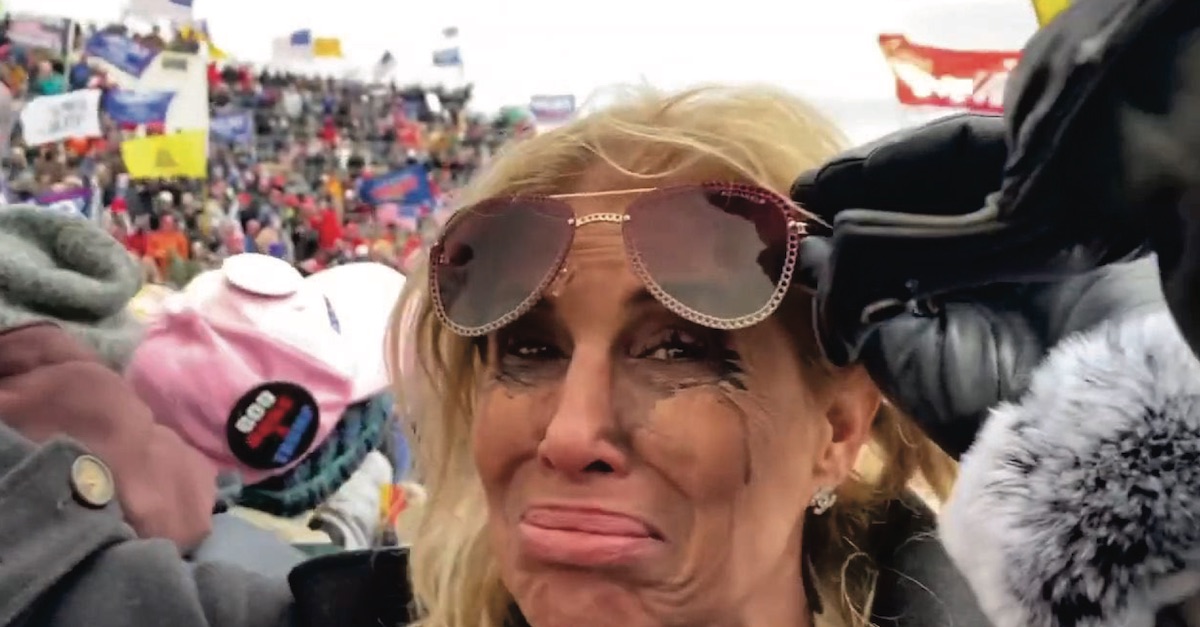
The Beverly Hills salon owner whose tear-streaked face became a lasting image from the Jan. 6 attack on the U.S. Capitol is trying to claw back part of her guilty plea.
“You are not going to take our Trumpy Bear!” Gina Bisignano memorably shouted through a bullhorn as her fellow Donald Trump supporters closed in on the Capitol building.
“This is 1776! And we the people will never give up,” she also said. “We will never let our country go to the globalists.”
Bisignano admitted to helping multiple rioters smash a glass window to the Capitol and then crawling through it to enter the building.
She had pleaded guilty in August to multiple crimes, including two felonies: obstruction of an official proceeding, which is technically punishable by up to 20 years in prison, and civil disorder, which carries a potential five-year prison sentence. She also pleaded guilty to a handful of misdemeanors.
Her plea agreement, which was unsealed in December, required that she cooperate with the government’s increasingly expansive prosecution of those who perpetrated the Capitol breach, and U.S. District Judge Carl Nichols had agreed to hold off on sentencing.
Bisignano filed her motion to withdraw part of her guilty plea on Friday. She is specifically asking to withdraw her plea to a single felony count of obstructing an official proceeding.
Bisignano “Feels Very Uncomfortable Admitting to Guilt to this Count.”
Apparently, Bisignano has been wanting to challenge the plea for months, particularly since Nichols had subsequently ruled that the very obstruction charge to which she pleaded guilty could be dismissed in Jan. 6 cases.
“Several communications between the Defendant and Counsel, make it clear that she felt and feels very uncomfortable admitting guilt to this Count, when she had no such intention,” her motion says. “Furthermore, in light of recent rulings by this Court, the Defendant has contacted Counsel numerous times for him to explain why she pled guilty to that Count, when in reality it does not apply.”
Bisignano first argues that she is, in fact, innocent of that particular crime, because she did not know that Congress was conducting an official proceeding in the Capitol as the increasingly violent crowd closed in on the building.
“[T]he Defendant told the Government during her proffer sessions that she did not know that a Senate hearing was taking place,” the motion says. “Also, during her plea hearing, she indicated her discomfort with the Statement of Offense, which was incorporated into the record, and therefore requested to speak with counsel. She felt that her actions did not rise to the level of [the charge] [citations removed].”
It is unclear why Bisignano ultimately agreed to plead guilty at that hearing even after speaking with her attorney and apparently not feeling that her actions matched the charge. An attorney for Bisignano did not immediately respond to Law&Crime’s request for comment.
Bisignano also says the plea is “tainted” because it “was not knowing and/or voluntary,” and appears to put the blame for this squarely on the judge.
“During the plea colloquy held on August 4, 2021, the Court did not fully follow the procedures that the Rule states must be followed,” the motion says, specifically accusing the court of failing to inform Bisignano of the nature of the charge, any mandatory minimum penalty, and any applicable forfeiture of rights in violation of federal criminal procedure rules.
“But for the Court’s failure to follow the mandate of Rule 11, Ms. Bisignano would not have pled guilty to [the obstruction count], since she did not believe that her conduct rose to the level of Obstructing an Official Proceeding and Aiding and Abetting,” the motion says. “Without the Court conducting a proper Rule 11 inquiry, Ms. Bisignano did not have a full knowledge and understanding of her rights and any waiver of those rights prior to accepting guilt.”
“She Felt that the Government Bullied Her.”
Bisignano also says that she did not have “an understanding of the law in relation to the facts” before pleading guilty, as required by the federal rules of criminal procedure. She argues that the law is unclear as to whether the obstruction charge should even apply to her case, and it certainly was not lost on Bisignano that Nichols, a Trump appointee, is the only judge so far in the D.C. District who has granted a request to dismiss the obstruction charge.
“By this Court’s own recent admission, there is a serious ambiguity in both 18 U.S.C. § 1512(c)(2) and § 2,” the motion says. “Given that this ambiguity was not resolved until after Ms. Bisignano entered her plea on August 4, 2021, she could not have had ‘an understanding of the law in relation to the facts’ before pleading guilty, as required under Rule 11.”
Bisignano also says that her guilty plea to the obstruction charge was not voluntary.
“The Defendant told the Government during her proffer sessions that she did not know that a Senate hearing was taking place,” the motion says. “Also, during her plea hearing, she indicated her discomfort with the Statement of Offense, which was incorporated into the record, and therefore requested to speak with counsel. She felt that the Government bullied her to plead to both 18 U.S.C. § 1512(c)(2) and § 2.”
The closing lines of Bisignano’s motion appear to acknowledge that she did not tell the truth while under oath at her August plea agreement hearing.
“Although Ms. Bisignano answered ‘no’ when the Court inquired whether anyone had threatened or forced her to plead guilty, she believed that she under duress and had no choice in the matter,” the motion says.
Read Bisignano’s motion, below.
[Image via FBI court filing.]